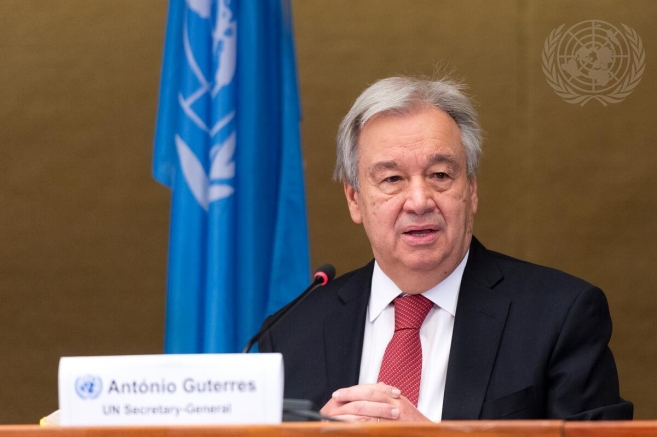New report on the protection of civilians in armed conflict issued on 20 May 2021
In his new report on the protection of civilians in conflict, UN Secretary-General António Guterres emphasises that, over the last year, civilians continued to bear the brunt of military operations and that “[a]rmed conflict continued to be characterized by high levels of civilian death, injury and psychological trauma…as well as damaged and destroyed homes, schools, markets, hospitals and essential civilian infrastructure such as electrical and water systems.” His report this year reviews the global state of the protection of civilians in armed conflict in 2020, with a particular focus on the state of the protection of medical care in armed conflict. For the twelfth year running, a key theme of the report is the protection challenges civilians face from the use of explosive weapons in populated areas.

Secretary-General António Guterres
Citing data from INEW members Action on Armed Violence (AOAV) and Airwars, the report notes that “civilian deaths and injuries from the use of explosive weapons reportedly decreased by 43 percent in 2020 compared with 2019, possibly resulting from parties’ shifting focus to the pandemic and related safety measures, as well as ceasefires in Libya and the syrian Arab Republic.” But the pattern of disproportionate civilian harm continued: alongside civilian casualties, “schools, places of worship, homes, hospitals, markets, airports, water and sanitation infrastructure, and other civilian objects have been destroyed or damaged, with long-term repercussions for civilians’ access to food, water, health, education and other essentials”.
Explosive weapons in populated areas
Recognising that much of this destruction is due to the use of explosive weapons in populated areas, the report notes that “[m]ore than 50 million people were affected by conflict in urban areas, where the use of explosive weapons, particularly those with wide-area effects, continues to expose civilians to a high risk of indiscriminate effects” and that “[t]he use of those weapons in urban areas also takes a devastating toll on essential infrastructure and services”. Citing AOAV’s latest data he noted that in 2020, when explosive weapons were used in populated areas 88 percent of those killed and injured were civilians, compared to 16 percent in other areas.
The UN Secretary-General’s report draws attention in particular to the devastating impact use of explosive weapons has on healthcare services as a result of death and injury to medical personnel, challenges of access such as ambulances and medical personnel reaching the wounded, damage and destruction to hospitals, electricity and water supply lines. He also highlighted how the lack of water and sanitation “exposes people to preventable diseases, hampers health-care provision, and compounds the health and nutrition risks caused by waterborne diseases”, and can also prevent hygiene measures required to prevent the spread of COVID-19.
A political declaration to strengthen the protection of civilians from explosive weapons
States have frequently emphasised the need to comply with international humanitarian law (IHL) in order to prevent harm from explosive weapons, but the Secretary-General’s report rightly notes that “[e]ven in cases in which parties reaffirm that they only use explosive weapons in compliance with the law, the level of civilian harm caused is often devastating. The facts on the ground continue to underline the need for parties to conflict to avoid the use of explosive weapons with wide-area effects in populated areas and to reassess and adapt their choice of weapons and tactics to avoid these well-documented consequences for civilians.”
In conjunction with this call to avoid the use of explosive weapons in populated areas, Guterres used his report to emphasise that it remains “critical to continue to support efforts to develop a political declaration in which States commit themselves to avoiding the use of explosive weapons with wide-area effects in populated areas and to developing operational policies on the basis of a presumption against such use.”
INEW’s latest briefing on protecting civilians from the use of explosive weapons is available here: https://bit.ly/INEWMay21PoC
For news on the negotiations around a political declaration see visit https://www.inew.org/declaration-negotiations/ and subscribe to INEW’s newsletter here
Photo credit: © UN Photo
